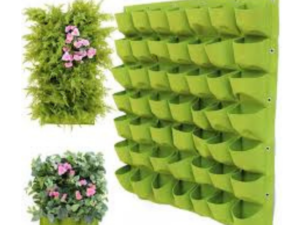Transform Your Garden with Durable,
Space-Saving Planting Bags
At Alpha Hydroponics Kenya, we offer versatile and durable Planting Bags designed to revolutionize how you grow plants. Whether you’re an urban gardener or a commercial farmer, our planting bags provide a practical solution for growing vegetables, herbs, flowers, and even small fruits in any space. Made from high-quality, UV-resistant materials, these bags are perfect for patios, balconies, rooftops, and open fields.
Why Choose Smart Urban Planting Bags?
How It Works (Step-by-Step)
Step 1: Choose the Right Bag
Step 2: Prepare Your Soil mix
Step 3: Plant Your Crops
Step 4: Water & Maintain
Pricing & Customization



We Tailor Solutions for Your Space
We don’t believe in one-size-fits-all. Our experts create a design plan based on your space, goals, and budget.
Frequently Asked Questions
Your Questions Answered
General Questions
What are planting bags?
Planting bags are durable, reusable containers specifically designed for growing crops like root vegetables in urban farming spaces. They offer excellent drainage and aeration, promoting healthier plant growth.
What types of vegetables can I grow in planting bags?
Planting bags are ideal for deep-root vegetables such as:
- Potatoes
- Sweet potatoes
- Carrots
- Cassava
- Arrowroots
- Beets
- Turnips
- Radishes
- Onions
- Ginger and turmeric
What materials are these bags made from?
Our planting bags are crafted from UV-resistant, breathable fabric or heavy-duty plastic to ensure durability and proper drainage for plants.
What sizes of planting bags are available?
We offer a variety of sizes, from small bags for herbs and flowers to large bags for vegetables and fruits, to suit all your gardening needs.
Are planting bags eco-friendly?
Yes, they are reusable, reduce reliance on traditional farming methods, and help conserve soil and water.
What materials are these bags made from?
Our planting bags are made of UV-resistant, breathable fabric or durable plastic that ensures proper aeration, drainage, and long-lasting performance.
Benefits-Related Questions
Why use planting bags for root vegetables?
- Space efficiency: Perfect for urban spaces with limited soil access.
- Healthy roots: Promotes deep root growth with aeration and drainage.
- Portability: Easily move bags to optimize sunlight or space usage.
- Sustainability: Reusable and reduces dependency on traditional land farming.
Do planting bags improve yields?
Yes, planting bags create optimal conditions for growth, often leading to higher yields than traditional farming methods.
Use Cases-Related Questions
Who should use planting bags?
- Urban farmers growing crops on rooftops, patios, or balconies.
- Hobby gardeners experimenting with sustainable food production.
- Community gardening projects focusing on deep-root crops.
Are planting bags suitable for commercial farming?
Yes, planting bags are scalable and can be used for commercial production of high-value root vegetables in controlled environments.
Plant-Specific Questions
What are the best practices for planting in bags?
- Fill the bag with loose, well-draining soil or a mix of compost and organic manure.
- Plant crops at the recommended depth for each vegetable type.
- Water consistently but avoid overwatering.
How many vegetables can I grow in one bag?
This depends on the size of the bag and the crop type. For example:
Cassava or arrowroots: 1–2 plants per large bag.
Potatoes: 3–5 plants per large bag.
Carrots: About 10–15 plants in medium-sized bags.
Can I mix crops in one bag?
It’s recommended to grow the same crop in a single bag to ensure uniform growth and nutrient distribution.
Installation and Setup
How do I set up planting bags?
- Choose a sunny, flat area like a patio, balcony, or garden space.
- Fill the bag with a nutrient-rich growing medium, such as compost, soil, and organic fertilizer.
- Plant your seeds or seedlings and water thoroughly.
Where should I place planting bags?
Planting bags are versatile and can be placed in:
Community urban farming spaces.
Balconies or patios.
Rooftops or backyards.
Can planting bags be used indoors?
Yes, planting bags can be used indoors with sufficient lighting, such as grow lights, and proper drainage trays to catch excess water.
Maintenance and Troubleshooting
How do I maintain planting bags?
How do I maintain planting bags?
- Water regularly but ensure proper drainage to avoid waterlogging.
- Add organic compost or fertilizer every 4–6 weeks to replenish nutrients.
- Check for pests and diseases, and remove weeds promptly.
How durable are planting bags?
Our bags are built to last for 3–5 years with proper care. Store them in a dry, cool place when not in use.
What happens if the soil becomes compacted?
Gently loosen the soil with a gardening tool to maintain aeration and ensure root growth is not hindered.
Performance Related Questions
How long do vegetables take to grow in planting bags?
Growth rates depend on the crop:
Cassava and arrowroots: 6–12 months.
Potatoes and sweet potatoes: 90–120 days.
Carrots and beets: 70–90 days.
Do plants grow better in planting bags compared to soil?
Yes, planting bags improve soil aeration and drainage, promoting better root development and faster growth.
Can planting bags handle extreme weather?
Our UV-resistant and breathable materials ensure durability in hot and cold climates. However, during heavy rain or frost, consider moving the bags to a sheltered area.
Miscellaneous
How much do planting bags cost?
Prices vary based on size and material. Contact Alpha Hydroponics Kenya for a customized quote.
Are planting bags reusable?
Yes, our planting bags are designed to be reused for multiple growing cycles. Clean them thoroughly between cycles for the best results.
Can planting bags be customized?
Yes, we offer planting bags in various sizes and designs to suit your specific needs.

Start Your Garden with Alpha Hydroponics Planting Bags!
Order now and enjoy a hassle-free gardening experience. Contact us today to get the perfect planting bags for your needs!































Reviews
There are no reviews yet.